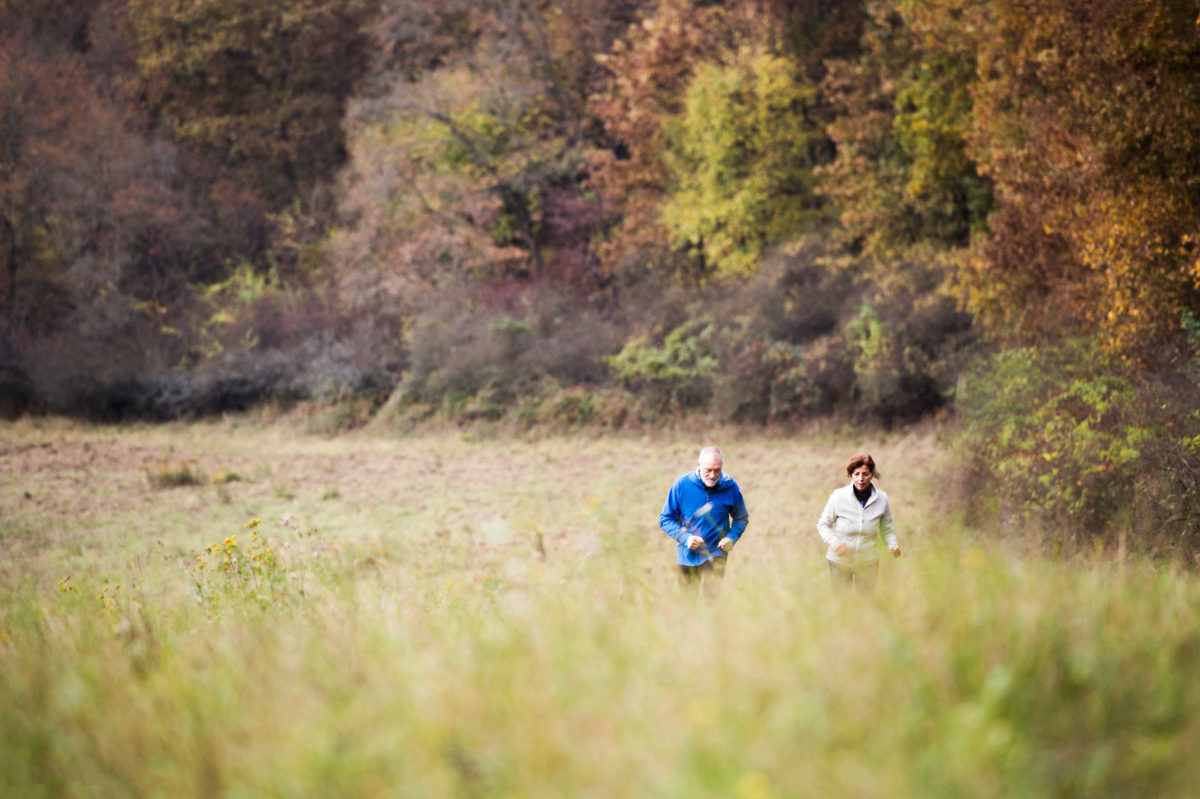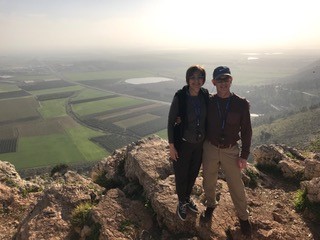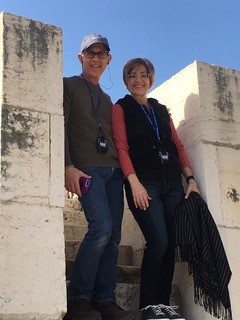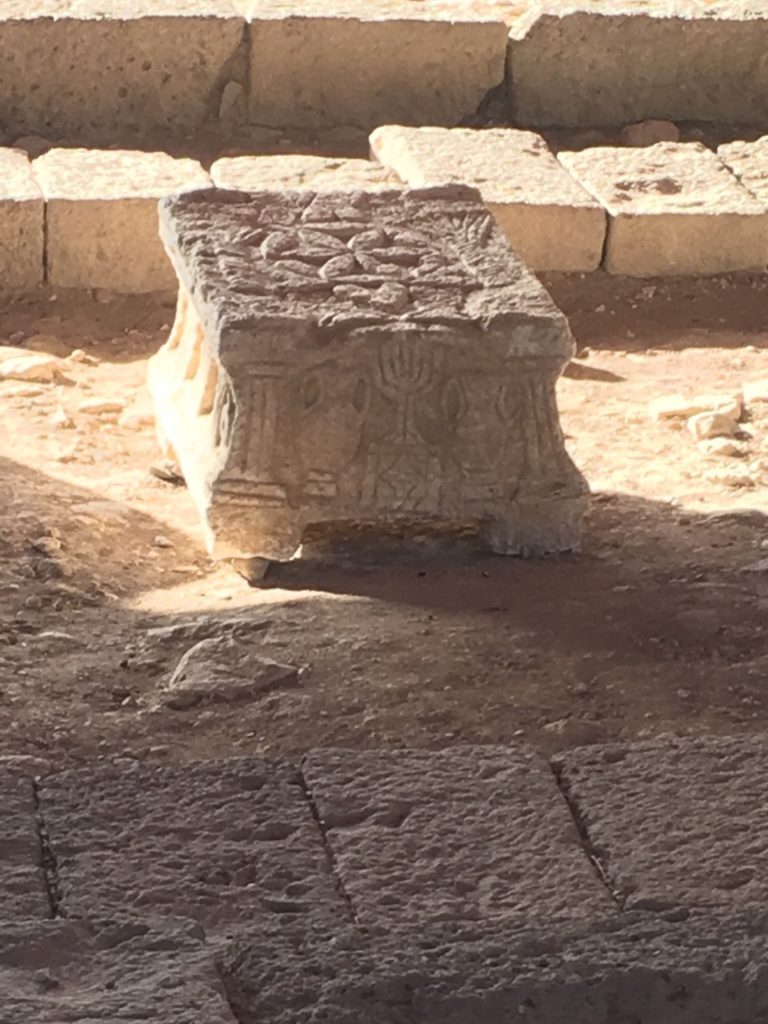Sermon for May 12, 2019
Readings: Acts 9:36-43 • Psalm 23:1-6 • Revelation 7:9-17 • John 10:22-30
This week’s theme is The Shepherd gives life. Psalm 23 is the Shepherd’s psalm, he leads us to still waters, we dwell in his house forever. In Acts 9 we see life restored as Peter prays for Tabitha (Dorcas) – who is raised from the dead. In Revelation we see that the Lamb of God is our shepherd. The sermon focuses on the passage in John where we see Jesus identifying his sheep as those who hear his voice and follow him.
God with Half the Heart
Suggestion: Have someone read John 10:22-30 prior to the sermon.
Introduction: Some of you may have seen the necklaces girls sometimes share. Each necklace is half a heart. One necklace says “Best,” and the other necklace says, “Friends.” The girls feel more complete when they are together. If you give me a bit of license, think of the two halves of a heart, with you having half and God having the other half. We are not complete until our heart is aligned with God’s heart. Thus the title, “The God with Half the Heart.”
Let’s discuss the passage from John.
At that time the Feast of the Dedication took place at Jerusalem; it was winter, and Jesus was walking in the temple in the portico of Solomon. The Jews therefore gathered around Him, and were saying to Him, “How long will You keep us in suspense? If You are the Christ, tell us plainly” (John 10:22-24 NASB).
This passage takes place during Hanukkah—the festival of lights—celebrated each year by many Jews. About 150 years before Jesus, Greek armies had overtaken Israel and one of the Greek leaders desecrated the temple by sacrificing a pig and putting pig blood throughout the temple. (Pigs, as you know, were unclean to Jews.) The Greeks also filled the temple with pagan idols and practices. Eventually there was an insurrection against the Greek leaders, and the Jews were able to get their land and temple back. It’s an interesting story about the Maccabees you may want to read some time.
The Jewish leaders scoured the temple of these things and renovated it, rededicating it to God. Part of the rededication was to light the Menorah—a sacred lampstand with seven branches used in the temple. However, they found only one day’s worth of oil that had not been contaminated by the Greeks. As the story goes—the light burned miraculously for eight days. Thus, you have the eight-day celebration of Hanukkah, the feast of rededication.
Hanukkah is a bit like our celebration of Fourth of July, which is a celebration of America’s declaration of independence. Hanukkah looked to the past for the most part because, during Jesus’ time as well, they were an oppressed people. It was a look to the past to see that God had been faithful in delivering them, and an act of hope for the future that God would deliver them again and give them independence again. It was two-sided—joy to celebrate God’s past deliverance and longing to look for God’s final deliverance.
Thus, you understand the Jews surrounding Jesus and asking, “Are you the deliverer?”

I believe it’s important to note here that Jesus would have grown up with this festival and participated in it as part of his Jewish identity. He interacted with Jewish institutions and festivals. He didn’t destroy or disdain them; rather, he showed how they point to him. If you allow me to bring the analogy in again, it’s like the Jews are holding up half a heart and waiting for God to bring the other half—to restore the relationship.
Jesus is showing he is the restoration. He is showing that God entered our world through a real person, and who lived right in the midst of Jewish traditions. Note how he answers their question:
Jesus answered them, “I told you, and you do not believe; the works that I do in My Father’s name, these bear witness of Me. But you do not believe, because you are not of My sheep” (John 10:25-26 NASB).
In Hanukkah and other ceremonies, the people of Israel were holding up their half heart to say, “we are waiting for you.” We are longing for you. Jesus comes through in the Gospels to say, “I have the other half. I am the other half. I am what you’ve been looking for. Come and be complete in me.”
He is the fulfillment of their special days.
- Sabbath—Jesus heals a man on the Sabbath. The work of God – such as healing someone – is more important than keeping to ceremonies and cultural identification. He is our Sabbath rest.
- Passover—celebration of God’s deliverance from Egypt. The sacrificed lamb spared the first-born among the Israelites. Jesus, the sacrificed lamb of God spared all of humanity.
- Feast of Tabernacles—everyday during this festival, a priest would take a pitcher of water from the pool of Siloam. He would pour this water in a large basin while everyone sang psalms about God’s salvation. The water was called—the waters of salvation. Jesus said, “If anyone comes to me, out of him will flow rivers of living water.” He is the fountain; he is the water-source; he is our salvation.
- Feast of Hanukkah—dedication of the temple. Jesus is the Holy of Holies, we are his temple.
Jesus is showing that these different trappings of being Israel point not just to a national identity, nor just to religious tradition, they point to HIM. They are about him.
My sheep hear My voice, and I know them, and they follow Me; and I give eternal life to them, and they shall never perish; and no one shall snatch them out of My hand” (John 10:27-28 NASB).
Illustration: The following illustration will need to be adapted to your own memories. Be aware that some people’s memories of their parents are painful; you may want to extend the illustration out to grandparents and guardians.
We all have our memories of home and how we knew Mom and Dad were home. In my house, it was the sound of the car on the gravel driveway. As a teenager, I may not have admitted it, but I was actually glad when to hear the sound. Dad was home! Order and peace had returned; we were taken care of. We are thrilled when we hear Daddy’s voice.
I believe this is what Jesus was referring to when he said, “My sheep hear my voice…”
Jesus comes and says: Papa is home. Abba is home. You don’t have to identify yourself by what you survived; you don’t need to celebrate what you did or what happened to you when you thought I wasn’t listening or aware. I am here! You are more than your history or your special days; you are the sons and daughters of God. You’re in my hand, and the heart is complete. Our heart-halves are put together now. I am here.
Jesus uses I AM statements to show all is pointing to him: I am the gate, I am the bread, I am the water, I am the shepherd, I am the sabbath. And at this flashpoint, Jesus says, “I am HERE.”
Then Jesus goes even further in his statement:
My Father, who has given them to Me, is greater than all; and no one is able to snatch them out of the Father’s hand. I and the Father are one” (John 10,29-30 NASB).
He uses some even more inflammatory language, as usual, in this exchange. This is reminiscent of the Hebrew shema: shema israel adonai eloheinu adonai echad. Hear oh Israel, the Lord our God is ONE. That word ONE meant one being, just one being of one substance. But it also meant UNIQUE. God is unique, there is nothing like God, there is no one like God. There is only one. And in saying these words over and over, we are the unique people of a unique God. There is no one like him, and we are his, so there is no one like us.
The Lord our God is one. Jesus and the Father are One. This is the deepest nerve that Jesus can strike here. They knew what he was saying, and many of them leaned down to get their stones at that point.
But others heard his voice and believed. They heard what he meant. The longing is over, the waiting is over—God’s deliverance is here. The heart is complete. Daddy’s home. We don’t have to be survivors anymore, because the King is on his throne.
The completed heart
Our heart joins with the Father’s heart and for the first time, it becomes whole. What does it mean to live with a completed heart? To live as a loved person?
Like the Jews Jesus was talking to, some of us still find our identity in what we were—in our traditions and special days. We still find our identity in what we do—good or bad, in what others say about us—good or bad, and in the things we have. But this is not where our identity comes from. We are the children of the King who could never love us any more or less than he does right now. We are sons and daughters of the One who created all things. We know he is the one who completes us—who has the other half of our heart.
Rest in that completeness. The two halves of the heart have come together.
Let me leave you with three charges:
- Spend time this week asking God to help you see how he has made your heart whole. Spend time in prayer and praise.
- Ask God to reveal to you someone who needs to know that God can and does make our heart whole. Share this truth with them.
- Listen—listen to the voice of the Shepherd, hear his words of affirmation and follow his direction. Doing so will fill your heart.
- We all have memories of home. Most of us remember some sign that Mom or Dad were home: a hat on the hook, boots by the door, the scent of a certain perfume. Discuss these memories. Do you think of God being “home” in the same way? (Note: if memories of parents are painful, this also works with a guardian, grandparent, or trusted friend.)
- The setting of John 10 is the Feast of Dedication, which in modern times is called Hanukkah. This feast commemorated a time from what is called the “four hundred years of silence” between the Old Testament and New Testament. Have you ever felt that God was silent? How did you know he was “home again” and the silence was broken?
- What is the difference between living life as a survivor and life as a fully-loved child of God? Do we identify ourselves by our scars or by our relationship with God? How?
- We talked in the sermon about Jesus upending or re-casting several Israelite institutions (Passover, Feast of Tabernacles, Hanukkah). What institutions of our culture do you think he would overturn or make us see differently? What would happen if Jesus showed up at the Super Bowl or the World Cup?
- What does Psalm 23 say to you personally?
- Read Revelation 7:9-17 and describe a time you felt you were led to springs of the water of life, or when God sheltered you.
Readings: Acts 9:36-43 • Psalm 23:1-6 • Revelation 7:9-17 • John 10:22-30
This week’s theme is The Shepherd gives life. Psalm 23 is the Shepherd’s psalm, he leads us to still waters, we dwell in his house forever. In Acts 9 we see life restored as Peter prays for Tabitha (Dorcas) – who is raised from the dead. In Revelation we see that the Lamb of God is our shepherd. The sermon focuses on the passage in John where we see Jesus identifying his sheep as those who hear his voice and follow him.
God with Half the Heart
Suggestion: Have someone read John 10:22-30 prior to the sermon.
Introduction: Some of you may have seen the necklaces girls sometimes share. Each necklace is half a heart. One necklace says “Best,” and the other necklace says, “Friends.” The girls feel more complete when they are together. If you give me a bit of license, think of the two halves of a heart, with you having half and God having the other half. We are not complete until our heart is aligned with God’s heart. Thus the title, “The God with Half the Heart.”
Let’s discuss the passage from John.
At that time the Feast of the Dedication took place at Jerusalem; it was winter, and Jesus was walking in the temple in the portico of Solomon. The Jews therefore gathered around Him, and were saying to Him, “How long will You keep us in suspense? If You are the Christ, tell us plainly” (John 10:22-24 NASB).
This passage takes place during Hanukkah—the festival of lights—celebrated each year by many Jews. About 150 years before Jesus, Greek armies had overtaken Israel and one of the Greek leaders desecrated the temple by sacrificing a pig and putting pig blood throughout the temple. (Pigs, as you know, were unclean to Jews.) The Greeks also filled the temple with pagan idols and practices. Eventually there was an insurrection against the Greek leaders, and the Jews were able to get their land and temple back. It’s an interesting story about the Maccabees you may want to read some time.
The Jewish leaders scoured the temple of these things and renovated it, rededicating it to God. Part of the rededication was to light the Menorah—a sacred lampstand with seven branches used in the temple. However, they found only one day’s worth of oil that had not been contaminated by the Greeks. As the story goes—the light burned miraculously for eight days. Thus, you have the eight-day celebration of Hanukkah, the feast of rededication.
Hanukkah is a bit like our celebration of Fourth of July, which is a celebration of America’s declaration of independence. Hanukkah looked to the past for the most part because, during Jesus’ time as well, they were an oppressed people. It was a look to the past to see that God had been faithful in delivering them, and an act of hope for the future that God would deliver them again and give them independence again. It was two-sided—joy to celebrate God’s past deliverance and longing to look for God’s final deliverance.
Thus, you understand the Jews surrounding Jesus and asking, “Are you the deliverer?”

I believe it’s important to note here that Jesus would have grown up with this festival and participated in it as part of his Jewish identity. He interacted with Jewish institutions and festivals. He didn’t destroy or disdain them; rather, he showed how they point to him. If you allow me to bring the analogy in again, it’s like the Jews are holding up half a heart and waiting for God to bring the other half—to restore the relationship.
Jesus is showing he is the restoration. He is showing that God entered our world through a real person, and who lived right in the midst of Jewish traditions. Note how he answers their question:
Jesus answered them, “I told you, and you do not believe; the works that I do in My Father’s name, these bear witness of Me. But you do not believe, because you are not of My sheep” (John 10:25-26 NASB).
In Hanukkah and other ceremonies, the people of Israel were holding up their half heart to say, “we are waiting for you.” We are longing for you. Jesus comes through in the Gospels to say, “I have the other half. I am the other half. I am what you’ve been looking for. Come and be complete in me.”
He is the fulfillment of their special days.
- Sabbath—Jesus heals a man on the Sabbath. The work of God – such as healing someone – is more important than keeping to ceremonies and cultural identification. He is our Sabbath rest.
- Passover—celebration of God’s deliverance from Egypt. The sacrificed lamb spared the first-born among the Israelites. Jesus, the sacrificed lamb of God spared all of humanity.
- Feast of Tabernacles—everyday during this festival, a priest would take a pitcher of water from the pool of Siloam. He would pour this water in a large basin while everyone sang psalms about God’s salvation. The water was called—the waters of salvation. Jesus said, “If anyone comes to me, out of him will flow rivers of living water.” He is the fountain; he is the water-source; he is our salvation.
- Feast of Hanukkah—dedication of the temple. Jesus is the Holy of Holies, we are his temple.
Jesus is showing that these different trappings of being Israel point not just to a national identity, nor just to religious tradition, they point to HIM. They are about him.
My sheep hear My voice, and I know them, and they follow Me; and I give eternal life to them, and they shall never perish; and no one shall snatch them out of My hand” (John 10:27-28 NASB).
Illustration: The following illustration will need to be adapted to your own memories. Be aware that some people’s memories of their parents are painful; you may want to extend the illustration out to grandparents and guardians.
We all have our memories of home and how we knew Mom and Dad were home. In my house, it was the sound of the car on the gravel driveway. As a teenager, I may not have admitted it, but I was actually glad when to hear the sound. Dad was home! Order and peace had returned; we were taken care of. We are thrilled when we hear Daddy’s voice.
I believe this is what Jesus was referring to when he said, “My sheep hear my voice…”
Jesus comes and says: Papa is home. Abba is home. You don’t have to identify yourself by what you survived; you don’t need to celebrate what you did or what happened to you when you thought I wasn’t listening or aware. I am here! You are more than your history or your special days; you are the sons and daughters of God. You’re in my hand, and the heart is complete. Our heart-halves are put together now. I am here.
Jesus uses I AM statements to show all is pointing to him: I am the gate, I am the bread, I am the water, I am the shepherd, I am the sabbath. And at this flashpoint, Jesus says, “I am HERE.”
Then Jesus goes even further in his statement:
My Father, who has given them to Me, is greater than all; and no one is able to snatch them out of the Father’s hand. I and the Father are one” (John 10,29-30 NASB).
He uses some even more inflammatory language, as usual, in this exchange. This is reminiscent of the Hebrew shema: shema israel adonai eloheinu adonai echad. Hear oh Israel, the Lord our God is ONE. That word ONE meant one being, just one being of one substance. But it also meant UNIQUE. God is unique, there is nothing like God, there is no one like God. There is only one. And in saying these words over and over, we are the unique people of a unique God. There is no one like him, and we are his, so there is no one like us.
The Lord our God is one. Jesus and the Father are One. This is the deepest nerve that Jesus can strike here. They knew what he was saying, and many of them leaned down to get their stones at that point.
But others heard his voice and believed. They heard what he meant. The longing is over, the waiting is over—God’s deliverance is here. The heart is complete. Daddy’s home. We don’t have to be survivors anymore, because the King is on his throne.
The completed heart
Our heart joins with the Father’s heart and for the first time, it becomes whole. What does it mean to live with a completed heart? To live as a loved person?
Like the Jews Jesus was talking to, some of us still find our identity in what we were—in our traditions and special days. We still find our identity in what we do—good or bad, in what others say about us—good or bad, and in the things we have. But this is not where our identity comes from. We are the children of the King who could never love us any more or less than he does right now. We are sons and daughters of the One who created all things. We know he is the one who completes us—who has the other half of our heart.
Rest in that completeness. The two halves of the heart have come together.
Let me leave you with three charges:
- Spend time this week asking God to help you see how he has made your heart whole. Spend time in prayer and praise.
- Ask God to reveal to you someone who needs to know that God can and does make our heart whole. Share this truth with them.
- Listen—listen to the voice of the Shepherd, hear his words of affirmation and follow his direction. Doing so will fill your heart.
- We all have memories of home. Most of us remember some sign that Mom or Dad were home: a hat on the hook, boots by the door, the scent of a certain perfume. Discuss these memories. Do you think of God being “home” in the same way? (Note: if memories of parents are painful, this also works with a guardian, grandparent, or trusted friend.)
- The setting of John 10 is the Feast of Dedication, which in modern times is called Hanukkah. This feast commemorated a time from what is called the “four hundred years of silence” between the Old Testament and New Testament. Have you ever felt that God was silent? How did you know he was “home again” and the silence was broken?
- What is the difference between living life as a survivor and life as a fully-loved child of God? Do we identify ourselves by our scars or by our relationship with God? How?
- We talked in the sermon about Jesus upending or re-casting several Israelite institutions (Passover, Feast of Tabernacles, Hanukkah). What institutions of our culture do you think he would overturn or make us see differently? What would happen if Jesus showed up at the Super Bowl or the World Cup?
- What does Psalm 23 say to you personally?
- Read Revelation 7:9-17 and describe a time you felt you were led to springs of the water of life, or when God sheltered you.




 For the record, the speculation I will make in the remainder of this article is based on ideas expressed by our guide, and what I have personally considered since returning from the trip. So, for the sake of this article, please “play along.”
For the record, the speculation I will make in the remainder of this article is based on ideas expressed by our guide, and what I have personally considered since returning from the trip. So, for the sake of this article, please “play along.”



